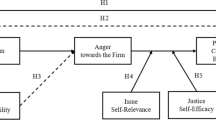Abstract
The role that personality plays in the justification of organizational sabotage behavior was examined. In a two phase study, 120 business students were first surveyed to create a list of 51 methods of sabotage. In the second phase, 274 other business students rated justifiability of the 51 methods and completed Machiavellian and hostility scales. A factor analysis of the justification ratings yielded four factors: (1) methods of sabotaging company profits and production, (2) informational sabotage, (3) violent and illegal methods, and (4) traditional labor methods of sabotage. A 2 (high versus low Machiavellianism) ×2 (high versus low hostility) ANOVA upon factor scores for justifiability revealed significant main effects for hostility and significant interactive effects on Factors 1 and 2. Results were discussed in terms of differences in management and blue collar methods of sabotage and in terms of a self-presentational approach to justification of sabotage.
Similar content being viewed by others
References
Allen, V. L. and Greenberger, D. B.: 1980, ‘Destruction and Perceived Control’, in A. Baum and J. E. Singer (Eds.), Advances in Environmental Psychology Vol. 2 (Erlbaum, Hillsdale).
Barry, V.: 1983, Moral Issues in Business (Wadsworth, Belmont, CA.
Brown, G.: 1977, Sabotage (Spokesman Books, Nottingham).
Buss, A. H. and Durkee, A.: 1957, ‘An Inventory for Assessing Different Kinds of Hostility’, Journal of Consulting Psychology 21, 343–349.
Christie, R. and Geis, F.: 1968, ‘Some Consequences of Taking Machiavelli Seriously’, in Borgatta, E. F., and Lamber, W. W. (Eds.), Handbook of Personality Theory and Research (Rand McNally, Chicago).
Christie, R. and Geis F.: 1970, Studies in Machiavellianism (Academic Press, New York).
Clutterbuck, D.: 1980, ‘A Question of Sabotage’, International Management 35, 25–27.
Dollard, J., Doob, L., Miller, N., Mowrer, O. W., and Sears, R. R.: 1939, Frustration and Aggression (Yale University Press, New Haven, CT).
Dubois, P.: 1979, Sabotage in Industry (Pelican, Harmondsworth, Middlesex).
Edwards, P. K. and Scullion, H.: 1982, The Social Organization of Industrial Conflict (Basil Blackwell, Oxford).
Felson, R. B.: 1978, ‘Aggression as Impression Management’, Social Psychology 41, 205–213.
Garrett, T. M. and Klonski, R. J.: 1986, Business Ethics (Prentice Hall, Englewood Cliffs, NJ).
Giacalone, R. A. and Pollard, H. G.: 1987, ‘The Efficacy of Accounts for a Breach of Confidentiality by Management’, Journal of Business Ethics 6, 19–23.
Giacalone, R. A. and Rosenfeld, P.: 1987, ‘Reasons for Employee Sabotage in the Workplace’, Journal of Business and Psychology 1, 367–378.
Lipman, I.: 1983, ‘Crimes Against Business: How to Deal With the Problem’, Vital Speeches of the Day 15, 61–65.
Lutz, W. D.: 1983, ‘Corporate Doublespeak: Making Bad News Look Good’, Business and Society Review 44, 19–22.
Olasky, M. M.: 1985, ‘Inside the Amoral World of Public Relations: Truth Molded for Corporate Gain’, Business and Society Review 52, 41–44.
Rosow, J. M.: 1974, The Worker and the Job (Prentice-Hall, Englewood Cliffs, N.J.).
Sartin, P.: 1970, L'homme au travail, forcat du temps? (Gamma, Paris).
Schlenker, B. R.: 1980, Impression Management (Brooks/Cole, Monterey, CA.).
Schlenker, B. R. (Ed.): 1985, The Self and Social Life (McGraw-Hill, New York).
Scott, M. B. and Lyman, S. M.: 1968, ‘Accounts’, American Sociological Review 33, 46–62.
Snyder, C. R., Higgins, R. L., and Stucky, R. J.: 1985, Excuses: Masquerades in Search of Grace (Wiley, New York).
Sepector, P. E.: 1975, ‘Relationships of Organizational Frustration With Reported Behavioral Reactions of Employees’, Journal of Applied Psychology 60, 5, 635–637.
Taylor, P.: 1972, Problems of Moral Philosophy (Dickenson Publishing, Belmont, CA).
Youngblood, S. A., DeNisi, A. S., Molleston, J. L., and Mobley, W. H.: 1984, ‘The Impact of Work Environment, Instrumentality Beliefs, Perceived Labor Union Image, and Subjective Norms on Union Voting Intentions’, Academy of Management Journal 27, 576–590.
Author information
Authors and Affiliations
Additional information
Robert A. Giacalone is currently Assistant Professor of Management Systems at the E. Claiborne Robins School of Business, University of Richmond. Dr. Giacalone has published a variety of articles in the areas of organizational impression management, organizational sabotage and business ethics. His book, Impression Management in the Organization, co-edited with Paul Rosenfeld, is due out in 1989.
Stephen B. Knouse is currently Associate Professor of Management at the University of Southwestern Louisiana. Dr. Knouse has published numerous articles on the letter of recommendation and impression management.
Rights and permissions
About this article
Cite this article
Giacalone, R.A., Knouse, S.B. Justifying wrongful employee behavior: The role of personality in organizational sabotage. J Bus Ethics 9, 55–61 (1990). https://doi.org/10.1007/BF00382564
Issue Date:
DOI: https://doi.org/10.1007/BF00382564




